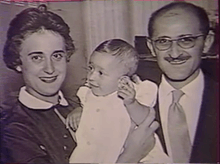Marc-Édouard Nabe
Marc-Édouard Nabe (born 1958), whose real name is Alain-Marc-Édouard Zannini, is a French writer.
Biography
Youth and first publications

Marc-Édouard Nabe (born Alain Zannini, December 27, 1958 in Marseille, France), is the only son of the Greek-Turkish-Italian jazz musician Marcel Zanini and Corsican mother Suzanne Zannini.[1] He grew up in Marseille, before moving to Boulogne-Billancourt in 1969.His father, who became successful with Tu veux ou tu veux pas in 1970, acquainted him with jazz musicians and painters.
Nabe’s nickname is due to his height. « nabot » is a pejorative word for a person who is short. Marc and Edouard are his second and third first-name, after ‘’Alain’’.[2]
At 16, Nabe published a sketch in the left-leaning newspaper Libération and many more in the anarchical magazine Hara Kiri.
In 1976, he plays rhythm guitar on a record with his father, Sam Woodyard and Milt Buckner. The name of the track, Nabe’s Dream, was the title of what Nabe thought for his first book. Finally, he chose Au régal des Vermines and Nabe’s Dream was used for the first volume of his diary, published in 1991.
In 1980, after his one-year national service, met Hélène Hottiaux; they had a child in 1990.
Au Régal des Vermines
His first book, Au Régal des Vermines, was written while Nabe did his national service. He finished it in June 1983, and it was published in January 1985 by Bernard Barrault. The book treats jazz, writers, art, homosexuality, his parents, his wife, racism, and other topics. Some media controversy accompanied Nabe during this time: after a February 1985 taping of the TV program Apostrophes, an hour-long show devoted to books, authors and literature, Nabe was aggressively accosted by a journalist, Georges-Marc Benamou; because he references Louis-Ferdinand Céline, Leon Bloy, and Lucien Rebatet, Nabe is accused of being an antisemite and a racist. After the program, his book was sold out, and Nabe was sued by the Licra (Ligue internationale contre le racisme et l’antisémitisme), an anti-racist association. In 1989, the charges were dropped.[3]
His second book, Zigzags (1986) is a compilation of various texts (essays, short stories, poetry, etc.) In 1986 is published a book about the jazz-singer Billie Holiday, L’âme de Billie Holiday (Billie Holiday’s soul), in which Nabe’s declare his love and admiration for the jazz and Holiday.
His first novel, Le Bonheur ("Happiness"), was published by Denoël and tells the story of Andrea de Bocumar (an anagram of his own name), a painter assistant specialized in feet on levitation.[4]
Self-publishing
In 2005, his long term publisher, Editions du Rocher, was sold to a pharmaceutical business. Nabe used to be paid monthly by the former president, Jean-Paul Bertrand, according to a non-written contract. In January 2010, he created a web platform which he used to sell his own books; the first new book being L'homme qui arrêta d'écrire ("The man who ceased to write"). He claimed to have sold 6000 copies; the book was nominated for the Prix Renaudot.[5]
In October 2011, Nabe self-publishes a novel about the DSK Affair, L'Enculé ("The fucked").
In December 2013, he announced the creation of his own magazine, Patience, whose first volume focused on Islamic State of Iraq and the Levant, discussing the jihadist movement in an 80-page long article called Un État de grâce ("a state of grace"). The second volume was published in August 2015, under the title La revanche de Choron ("Choron's revenge"). The 152-page long article is about the Charlie Hebdo shooting; its title references Professeur Choron, the co-founder of the first version of Charlie Hebdo (1970 to 1981). On the cover is a picture of Adolf Hitler holding a Je Suis Charlie sign. This volume of the magazine achieved some notoriety because of a publicity stunt during the announcement of the selection for the 2015 Prix Goncourt.[6]
Bibliography
Non-fiction
- Au régal des vermines, 1985
- Zigzags, 1986
- Chacun mes goûts, 1986
- L'Âme de Billie Holiday, 1986
- La Marseillaise, 1989
- Rideau, 1992
- Visage de Turc en pleurs, 1992
- Petits riens sur presque tout, 1992
- L'Âge du Christ, 1992
- Nuage, 1993
- Oui, 1998
- Non, 1998
- Coups d'Épée dans l'eau, 1999
- Une lueur d'espoir, 2001
- J'enfonce le clou, 2004
- Le Vingt-Septième Livre, 2009
- Les Porcs, 2017
Diary
- I, Nabe's Dream, 1992
- II, Tohu-Bohu, 1993
- III, Inch'Allah, 1996
- IV, Kamikaze, 2000
Novels
- Le Bonheur, 1988
- Lucette, 1995
- Je suis mort, 1998
- Alain Zannini, 2002
- Printemps de feu, 2003
- L'homme qui arrêta d'écrire, 2010
- L'Enculé, 2011
Poetry
- Loin des fleurs, 1998
Short stories
- K.-O. et autres contes, 1999
Other works
- L'affaire Zannini, 2003
- Morceaux choisis, 2006
References
- ↑ "Official Website Biography" (in French).
- ↑ "Interview de Marc-Édouard Nabe" (video). Tout le monde en parle. ina.fr. 17 November 2001.
- ↑ Cass. 2e Ch., 8 février 1989, n° 87-12.836
- ↑ Émission Apostrophes du 8 Janvier 1988.
- ↑ "Nabe: 'Je dois tout à Internet, mais lui aussi me doit tout'". L'Express (in French). 18 March 2011. Retrieved 21 January 2016.
- ↑ "L'annonce du lauréat du Goncourt perturbée par des activistes nabiens" (in French). AgoraVox. 13 November 2015. Retrieved 21 January 2016.